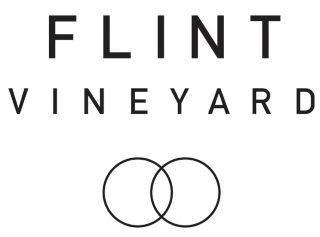
Is Flint organic?
We get asked this question a lot on tours and it never fails to elicit a gentle sigh from Ben, Founder and Winemaker.
It is of course a perfectly valid question, and we love the opportunity to geek out on the technical parts of what we do here.
“Are you organic?”, however, doesn’t have a straightforward answer – hence the sigh. Let’s open up this can of worms with Ben.
Ben on organic practices
My answer to this question is to ask another question, ‘What do you mean by organic?’ To this, with almost 100% certainty, the response is ‘no chemicals in the vineyard’.
Most grape varieties, and all the popular ones (Chardonnay / Pinot etc.), are susceptible to mildew and need to be protected from this.
Copper Sulphate and Sulphur are traditional fungicides, sprayed on vines to protect against Downy and Powdery Mildew. They are approved as organic, the justification being that they come naturally from the earth.
But both are harmful chemicals, particularly Copper which can be toxic to bees and, as some research suggests, bad for soil, although the latter is not fully understood.
Some further reading here: Pros and cons of copper in a Bordeaux vineyard.
And to quote Nigel Greening from Felton Road (biodynamic vineyard in New Zealand): “It seems to me that the certifier’s excuse for allowing copper and sulphur is that it occurs naturally, and therefore isn’t classed as chemical. Well, so is arsenic and cyanide, but that wouldn’t be a reason to include them in organics!”.
What does the law say?
The really interesting thing is that Copper is only approved by law as a fungicide for a maximum of 4 yearly sprays due to its harmful effects. This gives the vine about 6 weeks protection from mildew (the typical growing season for a vine in England is about 22 weeks). Thereafter, if a grower wishes to spray Copper, they can but must ensure they record it as being applied as a nutrient, for which bizarrely there are no limits.
If it was the case that a vineyard manager’s real intent was to spray Copper in this amount as a fungicide rather than a nutrient, then they would be falsifying their legal records. This is common practice...mmm.
I’m not knocking organic growers - I’ve worked for and respect many of them. There are many elements, including the importance of soil health and biodiversity that are admirable and things that we do here at Flint. But it’s not a black and white situation.
The fact is that Copper is not as effective as its synthetic counterparts in mildew prevention, meaning that you potentially need to spray more of it to do a similar job. And, as demonstrated above, there is a helpful loophole in the law that allows organic vineyards to do this with no restraint whilst retaining their credentials… just pointing this one out.
In short, a vineyard may say they are organic and don’t use chemicals, but it’s still worth asking a few more questions. They might only spray Copper and Sulphur. Some may claim that they spray nothing and manage disease by keeping the vines’ leaf area open to air circulation. I would guess that most viticulturalists who say ‘considered use of Copper and Sulphur’ or even ‘no Copper and Sulphur’ might actually mean ‘we spray Copper and Sulphur when we need to’.
The worst explanations I’ve heard are ‘at least I understand Copper over a synthetic alternative’ or ‘it’s the only choice we have and the best solution out of a bad bunch’. Copper has many interactions in both the vineyard and winery and its chemistry is complicated. There is also a strong rationale to suggest it may be more harmful than its synthetic counterparts. In my opinion, these explanations are not a justification.
Whether or not the science is fully understood, there is no doubt in my mind that this is a contentious subject and one which is generating concern within the industry.
More further reading on this here: Copper to be the biggest issue for wine growers this decade.
So, Ben is Flint organic?
No. I am not claiming in this article to be evidencing peer reviewed research. These are my thoughts based on experience and reading around the subject, including some peer reviewed science. I’m also not making any claims towards greenwashing. Vineyards at the end of the day are monocultures. They shouldn’t be there. At Flint we are not perfect but can certainly demonstrate many attempts to consider sustainability both environmentally and socially. And we take this very seriously.
We are not bound by the dogma of a particular governing body, which might compel us to use Copper, but we go to every length we can to make the most considered and sustainable decisions at every stage of our vineyard management and winemaking.
We’re Organic Plus.
Want to know more about how we care for our vines? Book a Vineyard Tour


Did a vineyard tour which was both educational and interesting. Loved the tasting after and came away with a few bottles. I never knew English wines could be so enjoyable!